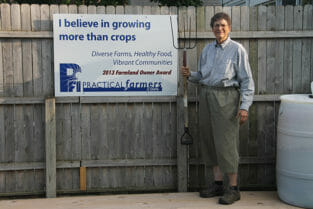Giving Back: Using Your Farmland to Benefit a Worthy Cause
Tips from Fellow Farmland Owners:
- Communicate your charitable giving values to your heirs
- With the tax benefits, donating farmland may make more financial sense than you think
- Talk with a charity about how they will use your farmland before making a donation
Helen Gunderson, of Ames, Iowa, grew up on a farm in Northwest Iowa and knows she is privileged to have inherited some of the land her family had accumulated since 1878, when her great-grandfather and his brother first came to Iowa. She has spent years reflecting on the ethical issues of land ownership and documenting the history of the rural neighborhood where she grew up (see http://www.gunderfriend.com/).
As she thought about the personal legacy she wanted to leave, she recognized that no plan for the future of her farmland was perfect. She also realized the importance of making the best choices possible based on currently available information and acknowledging that how circumstances evolve over the decades and centuries is out of her control.
In light of those factors, Helen concluded a few years ago that it would be best in her estate plans to give to the public and natural good by donating her land to a handful of organizations that had either enriched her life, could preserve her documentary work and/or had the best potential to ensure ethical stewardship of the land. The two main organizations she chose are the Iowa Natural Heritage Foundation and Practical Farmers of Iowa.
Many farmland owners choose Helen’s path for their farmland legacy. After all, we have been given a lot; donations to charity are a way to give back. Churches and universities for example, have benefited many times over from donations of farmland and use the rental or sale of the farmland for much-needed operating expenses.

Farmland owner Helen Gunderson, who has included Practical Farmers of Iowa and Iowa Natural Heritage Foundation in her planned giving.
There are a variety of ways to make a donation of your farmland, from a bequest (in your will) to a gift now with a reserved life estate, as Helen has arranged with the Iowa Natural Heritage Foundation. As she explains, the gift with a reserved life estate is “an irrevocable gift, but I will pay input costs such as property taxes and insurance and receive the income” during her lifetime.
Another option is the charitable remainder trust, a tax-exempt irrevocable trust, which is designed to reduce your taxable income. Through a charitable remainder trust, you transfer your farmland to the trust, and, for example, could use the farmland to provide income for your (and your spouse’s) lifetime. When you both pass on, the farmland is then donated to the designated charity. With a charitable remainder trust, you cannot change your mind after transferring your farmland.
When you consider a donation of farmland, ask questions about the charity’s intent and procedures for using your farmland donation. Some donors have been shocked to find that the nonprofit organization they selected turned around and immediately sold their farmland at auction. Former farmland owner Dale Nimrod, of Decorah, Iowa comments that organizations may view the land “as a financial investment and not, for example, as a strategy to keep farmers on the land or benefit conservation. If someone offers to donate a farm to a college, the college usually makes it very clear that it is not in the business of managing farms and that it will sell the farm upon receiving title to it, usually to the highest bidder. I think (and hope) most charitable institutions are up-front with potential donors in this regard.”
RESOURCES
Excellent resource laying out options for landowners who have conservation goals, from the Iowa Natural Heritage Foundation: http://iowalandoptions.org
Tools form farm transfer when conservation is a top goal:
http://landstewardshipproject.org/farmtransitionsconservationfinancingabstract
Assistance for landowners and farmers develop farm lease arrangements that are profitable and sustainable for the landowner, the farmer, the community and the land: http://sustainablefarmlease.org/
National research on farmland conservation, agricultural easements and more: http://www.farmlandinfo.org/
The Transition Incentives Program, whereby a retiring farmer with expiring CRP land may provide a long-term lease or sell to a beginning farmer to transition it to organic production: https://www.fsa.usda.gov/programs-and-services/conservation-programs/transition-incentives/
Iowa program that keeps farmland donations while benefiting your charities with the farm income: https://www.desmoinesfoundation.org/keep-iowa-growing.aspx
Minnesota program that retains farmland while benefiting your community with the farmland income: http://www.greaterminnesota.net/farmland-retention/
An Iowa land trust devoted specifically to sustainable agriculture: www.silt.org
More on Helen Gunderson, who is donating her farmland to various nonprofit organizations: www.practicalfarmers.org/farm-transfer
